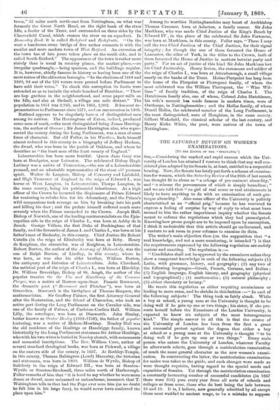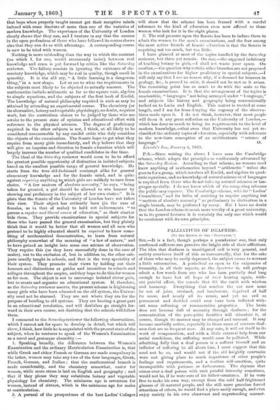THE SATURDAY RETT1EW ON WOMEN'S EXAMINATIONS.
[TO THE EDITOR. OF THE `. SPECTATOH.1
SIR,—Considering the marked and rapid success which the University of London has attained I venture to think that any well considered plan adopted by its Senate is, at least, entitled to a respectful hearing. Now, the Senate has lately put forth a scheme of examination for women, which the Saturday Review of the 26th of last month has thought fit to abuse as "a schewe of pre-eminent absurdity," and " a scheme the perverseness of which is simply boundless ; " and we are told that "no girl of real sense or real attainments is likely to have anything to do with an examination of such grotesque absurdity." Also some officer of the University is politely characterized as an "official prig," because he has ventured to express a feeling of surprise by way of reply to what must have seemed to him the rather impertinent inquiry whether the Senate meant to enforce the regulations which they had promulgated. Knowing how prone people are to be imposed upon by assumption, I think it undesirable that this article should go undiscussed, and I venture to ask room in your columns to examine its dicta.
The writer's main objection then (on the supposition that "a real knowledge, and not a mere smattering, is intended ") is that the requirements expressed by the following regulation are unduly various and exacting. The regulation is :— " Candidates shall not be approved by the examiners unless they show a competent knowledge in each of the following subjects (1) Latin, with grammar, history, and geography ; (2) any two of the following languages—Greek, French, German, and Italian ; (3) English language, English history, and geography (physical and topographical) ; (4) mathematics ; (5) natural philosophy ; (6) either chemistry or botany."
He treats this regulation as either requiring omniscience or leading to mere cram, and he shrieks in this fashion :—" In each of the following subjects ! The thing took us fairly aback. While a boy at school, a young man at the University is thought to be doing well if he gets up one or two things ; his sister, if she presents herself before the Examiners of the London University, is expected to know six subjects of the most heterogeneous kind." The simple answer to all this is that the course of the University of London has been from the first a great and successful protest against the dogma that either a boy at school or a young man at the University is thought "to be doing well if he gets up one or two things." Every male person who enters the University of London, whatever Faculty he afterwards selects, goes through a matriculation examination of much the same general character as the new women's examination. In constructing the latter, the matriculation examination for males was taken as the guide, and such changes were made as were thought requisite, having regard to the special needs and capacities of females. Yet through the matriculation examination a constantly increasing number of successful candidates (in 1867 there were 354) pass every year from all sorts of schools and colleges or from none, those who do best being the lads between 16 and 19. It is, I believe, now generally admitted by all except those most wedded to ancient usage, to be a mistake to suppose
that boys when properly taught cannot get their receptive minds imbued with some tincture of more than one of the varieties of modern knowledge. The experience of the University of London clearly shows that they can, and I venture to say that the success in the open professions of those who have followed its course shows also that they can do so with advantage. A corresponding course is now to be tried with women.
Nothing is more misleading than the way in which the contrast (on which I, for one, would strenuously insist) between real
knowledge and cram is put forward by critics like the Saturday
reviewer. The fallacy consists in ignoring the existence of elementary knowledge, which may be real in quality, though small in quantity. It is the old cry, "A little learning is a dangerous thing," in a new shape. Let us see to what the requirements in the subjects most likely to be objected to actually amount. The mathematics include arithmetic as far as the square root, algebra to simple equations, and the subjects of the first book of Euclid. The knowledge of natural philosophy required is such as may be attained by attending an experimental course. The chemistry (or its alternative, botany and vegetable physiology), no doubt, requires work, but the curriculum claims to be judged by those who are awake to the present state of opinion and educational effort with reference to the physical sciences. The degree of proficiency required in the other subjects is not, I think, at all likely to be considered unreasonable by any candid critic who duly considers the objects of the examination. The Senate hope to get what they require from many girls immediately, and they believe that they will give an impetus and direction to female education which will largely increase the number of qualified candidates in due time.
The ideal of the Saturday reviewer would seem to be to afford the greatest possible opportunity of distinction in isolated subjects based on the smallest possiblerange of general knowledge. He starts from the true old-fashioned contempt alike for general elementary knowledge and for the female mind, and is quite against requiring anything to which girls are unlikely to turn from
choice. "A few matters orabsolute necessity," he says, "being taken for granted, a girl should be allowed to win honour by showing real proficiency in the subject of her own choice." It is plain that the Senate of the University of London have not taken this view. Their object has evidently been (in the case of females, as in that of males) to hold out inducements "to
pursue a regular and liberal course of education," as their charter bids them. They provide examinations in special subjects for
those who have passed the general examination, but they plainly
think that it would be better that all women and all men who pretend to be highly educated should be required to know some
thing of mathematical demonstration, to learn from natural philosophy somewhat of the meaning of "a law of nature," and to have gained an insight into some one science of observation.
They require this (as they have successfully done in the case of
males), not to the exclusion of, but in addition to, the other subjects usually taught in schools, and that is the very speciality of their system. They promote their views by holding out their honours and distinctions as guides and incentives to schools and colleges throughout the empire, and they hope to do this for women as for men. The object is not to encourage isolated clever girls,
but to create and organize an educational system. If, therefore, as the Saturday reviewer asserts, the present, scheme is frightening many girls who have been educated on the old system, the Univer
sity need not be alarmed. They are not where they are for the purpose of bending to old systems. They are bearing a great part in an educational revolution, and will doubtless go straight forward in their own course, not doubting that the schools will follow them.
I commend to the Saturday reviewer the following observations, which I cannot ask for space to develop iu detail, but which will
show, I think, how little he is acquainted with the present state of the subject, when he ventures to speak of the Women's Examination as a novel and grotesque absurdity : 1. Speaking broadly, the difference between the Women's Examination and the ordinary Matriculation Examination is, that while Greek and either French or German are made compulsory in the latter, women may take any two of the four languages, Greek, French, German, and Italian ; that the mathematical branch is made considerably, and the chemistry somewhat, easier for women, while more stress is laid on English and geography ; and that if they please they may substitute botany and vegetable physiology for chemistry. The minimum age is seventeen for women, instead of sixteen, which is the minimum age for males at matriculation.
2. A perusal of the prospectuses of the best Ladies' Colleges will show that the scheme has been framed with a careful reference to the kind of education even now offered to those women who look for it in the right places.
3. The real pressure upon the Senate has been to induce them to admit the women to the men's examinations, and the fear among the most active friends of female education is that the Senate is requiring not too much, but too little.
I have glanced at most of the topics handled by the Saturday reviewer, but three yet remain. On oue,—the supposed indelicacy of teaching botany to girls,—I shall not waste your space. On another,—the question why certain other branches are not proposed in the examinations for higher proficiency in special subjects,—I will only say that I see no reason why, if a demand for honours in geology, &c., is proved to exist, it should not be met as it arises. The remaining point has as much to do with the male as the female examinations. It is that the arrangement of the topics is unscientific, " languages " not being arranged under "Language," and subjects like history and geography being conventionally tacked on to Latin and English. This matter is treated at some length, and I am far from denying the cogency of the observations made upon it. I do not think, however, that most people will deem it any great reflection on the University of London,— which has done so much to bring its requirements to the level of modern knowledge,—that even that University has not yet reclassified the ordinary topics of education, especially with reference to the new-born conception of an architectonic "science of language." 0. Lincoln's Inn, January 4, 1869.
P.S.—Since writing the above I have seen the Cambridge scheme, which adopts the principles so vociferously advocated by the Saturday Review. According to that schenie, no woman need know anything of mathematics beyond "arithmetic " unless she goes in for a group, which involves all Euclid, and algebra 4.0 quadratic equations, and no knowledge of natural science or of languages is required from those who do not take up natural sciences or languages specially. I do not know which of the competing schemes the public may espouse. The Cambridge scheme, with its" Ladies' Committees," and its bribe of omitting to require anything but "matters of absolute necessity" as preliminary to distinction in a single branch, may be preferred by ninny. But I have no doubt that the London scheme is much more worthy of a great university, as in its general features it is certainly the only one which would be consistent with its own principles.



































 Previous page
Previous page